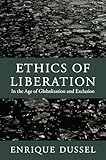Ethics of liberation: in the age of globalization and exclusion / Enrique Dussel ; Translated by Eduardo Mendieta, Camilo Pérez Bustillo, ...[et al.] ; translation edited by Alejandro A. Vallega
Por: Dussel, Enrique D [autor/a].
Mendieta, Eduardo [traductor/a] | Pérez Bustillo, Camilo [traductor/a] | Angulo, Yolanda [traductor/a] | Maldonado-Torres, Nelson [traductor/a].
Tipo de material: Libro
impreso(a)
Series Editor: Durham, NC: Duke University Press, c2013Descripción: xxiii, 715 páginas : ilustraciones ; 23 centímetros.ISBN: 0822352125; 9780822352129.Tema(s): Ética cristiana
Libro
impreso(a)
Series Editor: Durham, NC: Duke University Press, c2013Descripción: xxiii, 715 páginas : ilustraciones ; 23 centímetros.ISBN: 0822352125; 9780822352129.Tema(s): Ética cristiana| Tipo de ítem | Biblioteca actual | Colección | Signatura | Estado | Fecha de vencimiento | Código de barras |
|---|---|---|---|---|---|---|
| Libros |
Biblioteca Villahermosa
Texto en la configuración de la biblioteca Villahermosa |
Acervo General | 170.98 D8 | Disponible | ECO050006317 |
Incluye bibliografía: páginas 655-687 e índice temático: páginas 689-715
About the Series.. Editor's Foreword to the English Edition.. Preface.. Introduction: .. I.1. Origin of the Interregional System: Afro-Bantu Egypt and the Semites of the Middle East.. I.2. Cultures without Direct Links to the System: The Mesoamerican and Inca Worlds.. I.3. The "Indoeuropean" World: From the Chinese to the Roman Empire.. I.4. The Byzantine World, Muslim Hegemony, and the East: The European Medieval Periphery.. I.5. Unfolding of the World System: From "Modern" Spain of the Sixteenth Century.. I.6. Modernity as "Management" of Planetary Centrality and Its Contemporary Crisis.. I.7. The Liberation of Philosophy?.. Part I: Foundation of Ethics.. I. The Material Moment of Ethics: Practical Truth.. 1.1. The Human Cerebral Cognitive and Affective-Appetitive System.. 1.2. Utilitarianism.. 1.3. Communitarianism.. 1.4. Some Ethics of Content or Material Ethics.. 1.5. The Criterion and Universal Material Principle of Ethics.. 2. Formal Morality: Intersubjective Validity.. 2.1. The Transcendental Morality of Immanuel Kent.. 2.2. The Neocontractualist Formalism of John Rawls.. 2.3. The "Discourse Ethics" of Karl-Otto Apel.. 2.4. The Moral Majority of Jürgen Habermas.. 2.5. The Criterion of Validity and the Universal, Formal Principle of Morality.. 3. Ethical Feasibility and the "Goodness Claim".. 3.1 The Pragmatism of Charles S. Pierce.. 3.2. The Pragmatic Realism of Hilary Putnam.. 3.3. The Functional or Formal "System" of Niklas Luhmann.. 3.4. The "Feasibility" of Franz Hinkelammert.. 3.5. The Criterion and the Ethical Principle of Feasibility.. Part II. Critical Ethics, Antihegemonic Validity, and the Praxis of Liberation
4. The Ethical Criticism of the Prevailing System: From the Perspective of the Negativity of the Victims.. 4.1 Marx's Critique of Political Economics.. 4.2. The "Negative" and the "Material" in Critical Theory: Horkheimer, Adorno, Marcuse, and Benjamin.. 4.3. The Dialectics of Drive.. 4.4. The Critical Criterion and the Material or Ethical-Critical Principle.. 5. The Antihegemonic Validity of the Community of Victims.. 5.1. Rigoberta Menchü.. 5.2. The Ethical-Critical Process of Paulo Freire.. 5.3. Functionalist and Critical Paradigms.. 5.4. The "Principle of Hope" of Ernst Bloch.. 5.5. The Critical-Discursive Criterion and the Principle of Validity.. 6. The Liberation Principle.. 6.1. The "Organization Question": From Vanguard toward Symmetric Participation-Theory and Praxis?.. 6.2. The "Issue of the Subject": Emergence of New Sociohistorical Actors.. 6.3. The "Reform-Transformation" Question.. 6.4. The "Question of Violence": Legitimate Coercion, Violence, and the Praxis of Liberation.. 6.5. The Critical Criterion of Feasibility and the Liberation Principle.. Appendix 1. Some Theses on Order of Appearance in the Text.. Appendix 2. Sais: Capital of Egypt.. Notes.. Bibliography.. Index
Available in English for the first time, this much-anticipated translation of Enrique Dussel's Ethics of Liberation marks a milestone in ethical discourse. Dussel is one of the world's foremost philosophers. This treatise, originally published in 1998, is his masterwork and a cornerstone of the philosophy of liberation, which he helped to found and develop. Throughout his career, Dussel has sought to open a space for articulating new possibilities for humanity out of, and in light of, the suffering, dignity, and creative drive of those who have been excluded from Western Modernity and neoliberal rationalism. Grounded in engagement with the oppressed, his thinking has figured prominently in philosophy, political theory, and liberation movements around the world. In Ethics of Liberation, Dussel provides a comprehensive world history of ethics, demonstrating that our most fundamental moral and ethical traditions did not emerge in ancient Greece and develop through modern European and North American thought. The obscured and ignored origins of Modernity lie outside the Western tradition. Ethics of Liberation is a monumental rethinking of the history, origins, and aims of ethics. It is a critical reorientation of ethical theory. eng
